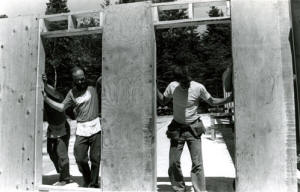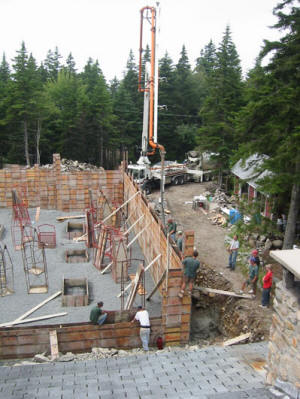
The Institute and Foundation: An evolving partnership
 The Humboldt Field Research Institute developed from the
reorganization of Eagle Hill Field Research Station during 1996. The
Station was founded in 1981 as a tax exempt [501(c)(3), 509(a)(2)]
nonprofit organization in order to provide advanced and
professional-level field seminars in natural history. These widely
acclaimed seminars, taught since 1987 by recognized regional, national,
and international experts, have evolved over the years to cover an
exceptional range of specialized subjects, including many that are not
often taught at academic institutions, and including seminars on
ecological restoration.
The Humboldt Field Research Institute developed from the
reorganization of Eagle Hill Field Research Station during 1996. The
Station was founded in 1981 as a tax exempt [501(c)(3), 509(a)(2)]
nonprofit organization in order to provide advanced and
professional-level field seminars in natural history. These widely
acclaimed seminars, taught since 1987 by recognized regional, national,
and international experts, have evolved over the years to cover an
exceptional range of specialized subjects, including many that are not
often taught at academic institutions, and including seminars on
ecological restoration.
In 1993, Eagle Hill Field Research Station began publishing the Maine Naturalist, a quarterly peer-reviewed natural history science journal that featured original research articles, as well as general interest articles, field notes, and research summaries. In 1997, the journal expanded its geographical focus to cover the northeastern United States and Canada, and was renamed the Northeastern Naturalist. An interest in the merits and potential of a developing a parallel journal for the southeastern United States grew over the years among Institute alumni and faculty members and eventually led to the publication by the Institute of the Southeastern Naturalist in 2002.
 The overall mission of the Institute was broadened in 1999 to include
natural history
expeditions to Latin America, especially Venezuela, the first
country visited by Alexander von Humboldt in 1799 at the beginning of
his 5-year expedition in Latin America. The Institute is thus actively
building upon von Humboldt's important legacy in field studies of
natural history in the Americas. During 1999, the Institute co-hosted a
symposium on Alexander von Humboldt’s natural history legacy in
collaboration with the Venezualan and German consulates in Boston and
Boston University.
The overall mission of the Institute was broadened in 1999 to include
natural history
expeditions to Latin America, especially Venezuela, the first
country visited by Alexander von Humboldt in 1799 at the beginning of
his 5-year expedition in Latin America. The Institute is thus actively
building upon von Humboldt's important legacy in field studies of
natural history in the Americas. During 1999, the Institute co-hosted a
symposium on Alexander von Humboldt’s natural history legacy in
collaboration with the Venezualan and German consulates in Boston and
Boston University.
The Eagle Hill Foundation was established in 2000 as a tax exempt [501(c)(3) 509(a2)] nonprofit organization. The Foundation took over responsibility for some of the former program efforts of the Institute, such as the art workshops and, as a result, works in close collaboration with it. This arrangement allows the Institute to focus on its program interests in the natural history sciences, while the Foundation focuses its interests on interdisciplinary aspects of the natural history sciences and the cultural history of nature. The Foundation’s programs now include residencies and retreats for artists and art historians, the Panorama public lecture series, and Cosmos research seminars focusing on literary sources.
In 2006, the Institute and Eagle Hill Foundation began collaborating on the Foundation's first journal, called the Journal of the North Atlantic, focusing on the peoples of the North Atlantic, their expansion into the region over time, and their interactions with their changing environment.
The most recent efforts of the Institute involve plans for developing an interdisciplinary retreat style study and meeting facility on the summit of Eagle Hill.